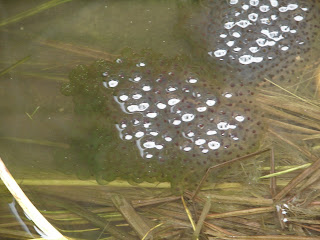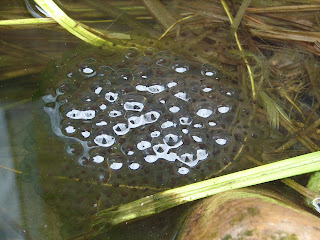The first snowdrops appeared about a month ago. In the last week or so the primroses have come up, and just this week the crocuses, which have been pushing up little buds for a while now, came into full bloom. Recently the weather has been almost summery. In the evenings when I walk back from college now the wildlife is still out and about, people are walking their dogs, there are bulbs everywhere in the parks, with great swathes of yellow and purple everywhere you look, and the kids are even playing outside well into the evenings now. Apart from the wind, which is still a little nippy, it feels like August. Everything is coming alive! Here's a look at what we've been up to recently.


^ I don't know what this evergreeen shrub is called, but the bees love it and when it's in flower it smells wonderful.

^ Hellebores

^ The garden today.

^ First Celandines

^ Cardoons sprouting up from the ground.

^ A forgotten Brussels sprout plant left over from 2 years ago!

^ Snowdrops
^ Some plants are already in full flower
^ Snowdrops again!
^ Crocuses emerging through a jungle of strawberry plants

^ First primroses!

^ Yellow crocuses amongst the wall flowers

^ Purple crocus buds
Below: Birds' nests from last year: in the climbing hydrangea (blackbird); behind the satelite dish (collared dove); an a nest from an unknown bird that fell out of the hazel tree, beautifully constructed.



Dad's Velvety Aubergines
Not exactly seasonal or eco-friendly but a great vegetarian option and perfect for evenings that are still a little chilly.
1 aubergine, cut into medium sized chunks
3 fresh tomatoes
fenugreek and coriander seeds
1 clove garlic
a little vegetable oil
salt and pepper
Fry all the ingredients together until the tomatoes have cooked down to a delicious pulp. The aubergines will still be raw and spongey, but turn of the heat and place a lid over the pan. Allow to sit for as long as possible, allowing the aubergines to steam. Reheat when you're ready to eat. The aubergines will be really velvety and melt-in-the-mouth, absolutely delicious!
NB: You can make the recipe spicier by adding chilli or cayenne. Allspice is also a nice addition.
I have been continuing with my ever-growing reading list. I recently finished Regeneration by Pat Barker, a really good read. I loved the style of the writing - simple and subtle but absolutely sublime - and the depiction of the suffering endured by both officers, infantry troops and the people who had to care for them during WW1 was incredibly moving, especially as I recently went on a college trip to the Battlefields and saw the enormous cemeteries left over from the war for myself. I'm not enjoying First Casualty by Ben Elton as much however. Although still an interesting storyline, the writing style feels clunky and crude when I compare it to Pat Barker's work. I also have a new, eco-related addition to my reading list: Whole Earth Discipline by eco-pioneer Stewart Brand. I haven't started it yet but I'm excited about reading this book as it looks like it's going to make me rethink some of my ideas about green-ness. I like the fact that it is centred on treating the Earth as a whole though, rather than just sorting out a few problems here or there. Should be interesting...I'll let you know how I get on!
Dad has visited the bees to see how they have been getting on. We are now down to 3 hives, which is fairly disappointing. Some of the hives seem to have emptied before the weather got too cold, others have clearly diwed out over the winter, and oddly didn't eat any of the vast quantities of honey and sugar we fed back to them. This is interesting though as it presents us with a number of opportunities. The first one is to learn more - I want to become a better beekeeper so that I know how to take better care of these fascinating animals who so kindly allow me to try and nurture them. The second is that we're planning to try out a number of different methods this year. We'll be giving some hives the Warre treatment - i.e. letting them make the choices for themselves - and treating others as we would normally. And thirdly, it's interesting to note that all the hives that survived are our grumpiest bees which we have captured from the wild...I wonder if this says anything about the genetically-engineered artificially produced blood lines that one buys from queen breeders or has imported from Hawaii? Dad has ordered a few more queens to arrive this year, and we're already on the swarm list. But I wonder whether angry, swarming, wild bees are better able to survive than cushy calm bees that are made by humans for humans...
And finally, I have been planning a project for when I leave college (and that will probably end up taking over my whole life for the next 50 years...hope so!). My plan is to research and experience permaculture and sustainable practice from across the world - the Americas, Africa, Europe, Asia, Australasia... in order for me to learn more about the ecosystems of the Earth and how to work with them. The idea is to make my way around the world (or as much of it as I can afford) using the most efficient transport possible, working on aid projects and learning from people who really care about working with the planet rather than against it. I intend to record my travels on the blog and maybe when I've learned from the world's best I'll be able to pass my knowledge on in other ways too. I'm beginning to look up possible places to visit but if anyone has any suggestions of places I can go or people I could contact, please leave a comment! I'll be writing more about this as the year goes on, and I hope you''ll find it as exciting as I am finding it already!
Thanks for all your comments and support through the blog - now that things are happening out there in the garden hopefully i'll have more to blog about! ^^
























